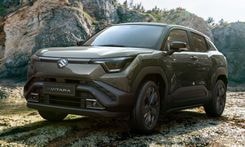Pros And Cons Of Shifting From Internal Combustion Engine Car To Electric Car

Times are indeed changing and so is the way we move around in this world. Electric cars aren't some niche vehicles that only a few could own. They are now within the reach of everyone. With the Indian government encouraging their use and charging infrastructure being set up around the country, there's a good possibility that you'd be tempted to go for an EV when you're buying a new car.
If you plan on making this switch, read on to find out the pros and cons of shifting from an combustion engine car to an electric car.
Pros of Shifting from an Engine Car to an Electric Car:
Less Environmental Impact:

Photo Credit: pixabay.com
Engine cars burn fossil fuels and the by-product of this process are harmful gases that saturate in the atmosphere and create air pollution. Opting for an electric car leads to zero emissions and allows you to free yourself from the guilt of causing this environmental damage.
Savings:
As fuel prices continue to soar, electric cars are way more cost-efficient in the short as well as long run. If you own a petrol car, it can cost you around Rs 9 to Rs 10 per kilometre of running on an average. As for an electric car, that cost comes significantly down to Rs 1.2 to 1.4 per kilometre as per the average electricity costs of today.
Tax Benefits:

Photo Credit: pixabay.com
In an effort to increase EV adoption, a number of Indian states are waiving off road tax on them. Moreover, the Government of India has come up with an extensive program for transport electrification, which is being implemented through Faster Adoption and Manufacturing of (Hybrid &) Electric Vehicles (FAME) schemes (I and II). These plans result 5% reduction of GST on EVs and even offer an income tax exemption of up to Rs. 1,50,000 on interest payments for EV loans.
Lower Maintenance Costs:
Engine cars need large engines that occupy a lot of the space on their chassis. An EV runs on a motor that's directly powered by a battery, which means there's a considerably low number of parts to deal with. During the long term, this results in remarkably low maintenance costs.
Cons of Shifting from an Engine Car to an Electric Car:
Higher Prices:

Photo Credit: pixabay.com
Electric cars are generally more expensive compared to their engine-based peers. However, as the adoption of EVs keeps on increasing, those prices are steadily going down as well. Also, the savings you make over the long term by not spending on a petrol or diesel car, nullify the higher price that you'll pay for an electric car.
Limited Charging Stations:
The lack of charging stations is a major point of anxiety that discourages people from buying EVs. Long journeys become very tricky since there's always the fear of finding yourself in the middle of nowhere with no charging station in sight.
Charging Takes Time:

Photo Credit: www.pexels.com
Whenever you do find a charging station, juicing up the battery of your car takes a pretty long time. This is one advantage petrol/diesel cars have over EVs as they can be refuelled in only a few minutes.
Battery Replacement:
The batteries of electric cars are expensive so whenever they reach the end of their cycles, replacing them will incur a big cost.
Those being the advantages and disadvantages of shifting from engine cars to electric cars, we do think the pros do outweigh the cons.
Latest News
- Jaiveer Mehra | Jan 30, 2026Jeep India Confirms ‘First Model of Future Lineup’ To Arrive In 2027: What Could It Be?The SUV maker confirmed its first all-new model for India since 2022.1 min read
 Jaiveer Mehra | Jan 30, 2026New Bentley Continental GT S Debuts As Sportier Alternative To Standard CGTThe GT S shaves the 0-100 kmph time down from 3.7 seconds to 3.5 seconds despite not offering any additional power.1 min read
Jaiveer Mehra | Jan 30, 2026New Bentley Continental GT S Debuts As Sportier Alternative To Standard CGTThe GT S shaves the 0-100 kmph time down from 3.7 seconds to 3.5 seconds despite not offering any additional power.1 min read Jaiveer Mehra | Jan 29, 2026Tesla Model S, Model X Production To End By Mid-2026Company CEO Elon Musk made the announcement during the company’s Q4 2025 earnings call.3 mins read
Jaiveer Mehra | Jan 29, 2026Tesla Model S, Model X Production To End By Mid-2026Company CEO Elon Musk made the announcement during the company’s Q4 2025 earnings call.3 mins read car&bike Team | Jan 29, 2026Mahindra Vision S SUV Interior Spied For The First TimeTest mules of the boxy SUV were initially spotted on public roads in mid 2025, with the concept debuting in August.1 min read
car&bike Team | Jan 29, 2026Mahindra Vision S SUV Interior Spied For The First TimeTest mules of the boxy SUV were initially spotted on public roads in mid 2025, with the concept debuting in August.1 min read car&bike Team | Jan 29, 2026Hyundai Exter Facelift Spied Testing Ahead Of India DebutUpdated Exter is expected to make its debut later in the year as Hyundai will look to better compete with the Punch.1 min read
car&bike Team | Jan 29, 2026Hyundai Exter Facelift Spied Testing Ahead Of India DebutUpdated Exter is expected to make its debut later in the year as Hyundai will look to better compete with the Punch.1 min read Janak Sorap | Jan 29, 20262023 World Superbike Championship-winning Ducati Panigale V4 R: Photo GalleryThis one is not tribute bike or a factory replica, but the very machine ridden by Álvaro Bautista during his record-breaking WorldSBK title in the 2023 season.1 min read
Janak Sorap | Jan 29, 20262023 World Superbike Championship-winning Ducati Panigale V4 R: Photo GalleryThis one is not tribute bike or a factory replica, but the very machine ridden by Álvaro Bautista during his record-breaking WorldSBK title in the 2023 season.1 min read
 Bilal Firfiray | Jan 21, 2026Tata Punch Facelift Review: New Turbo Engine; Same Old SoulWith the update, the Tata Punch facelift retains its character of being a healthy runabout, which is perfect for Indian roads. But have these changes made it any better?7 mins read
Bilal Firfiray | Jan 21, 2026Tata Punch Facelift Review: New Turbo Engine; Same Old SoulWith the update, the Tata Punch facelift retains its character of being a healthy runabout, which is perfect for Indian roads. But have these changes made it any better?7 mins read Amaan Ahmed | Jan 17, 2026Bajaj Chetak C25 First Ride Review: Basic, Likeable E-Scooter For First-Time RidersThe Chetak C25, in quite a few ways, is poles apart from the larger and more powerful 30 and 35 Series models, but in its mannerisms, it is very much a Chetak.8 mins read
Amaan Ahmed | Jan 17, 2026Bajaj Chetak C25 First Ride Review: Basic, Likeable E-Scooter For First-Time RidersThe Chetak C25, in quite a few ways, is poles apart from the larger and more powerful 30 and 35 Series models, but in its mannerisms, it is very much a Chetak.8 mins read Bilal Firfiray | Jan 9, 2026Toyota Urban Cruiser Hyryder: 10,000 km Long-Term ReviewAfter spending over three months and 10,000 km with the Toyota Urban Cruiser Hyryder Hybrid, we were impressed by its real-world mileage, seamless hybrid, practical comfort, and Toyota reliability. Is it the best C-SUV then?5 mins read
Bilal Firfiray | Jan 9, 2026Toyota Urban Cruiser Hyryder: 10,000 km Long-Term ReviewAfter spending over three months and 10,000 km with the Toyota Urban Cruiser Hyryder Hybrid, we were impressed by its real-world mileage, seamless hybrid, practical comfort, and Toyota reliability. Is it the best C-SUV then?5 mins read Seshan Vijayraghvan | Jan 8, 20262026 Mahindra XUV 7XO Review: Big On Tech, Bigger On ComfortThe new Mahindra XUV 7XO is flashier, feature packed, and comes with more advanced tech. But are the changes just incremental or actually substantial?1 min read
Seshan Vijayraghvan | Jan 8, 20262026 Mahindra XUV 7XO Review: Big On Tech, Bigger On ComfortThe new Mahindra XUV 7XO is flashier, feature packed, and comes with more advanced tech. But are the changes just incremental or actually substantial?1 min read Preetam Bora | Jan 10, 2026Simple One Gen 2 First Ride Review: 265 km Claimed Range!The Gen 2 model of Simple Energy’s first electric scooter gets a fair few updates, including new features, tech, more range and lighter weight. We spent a couple of hours with the Simple One Gen 2 to find out if it manages to impress.6 mins read
Preetam Bora | Jan 10, 2026Simple One Gen 2 First Ride Review: 265 km Claimed Range!The Gen 2 model of Simple Energy’s first electric scooter gets a fair few updates, including new features, tech, more range and lighter weight. We spent a couple of hours with the Simple One Gen 2 to find out if it manages to impress.6 mins read


























































































































